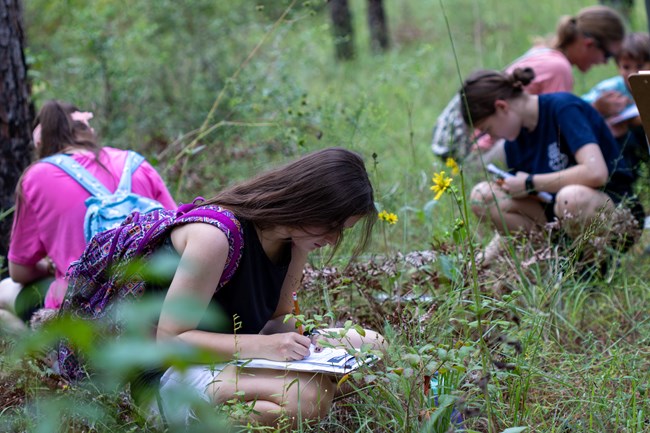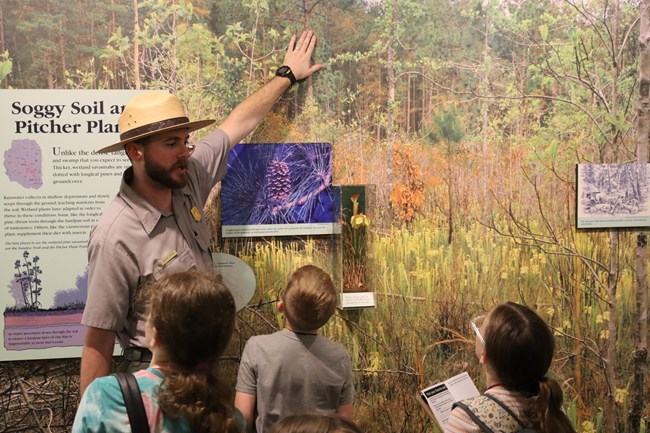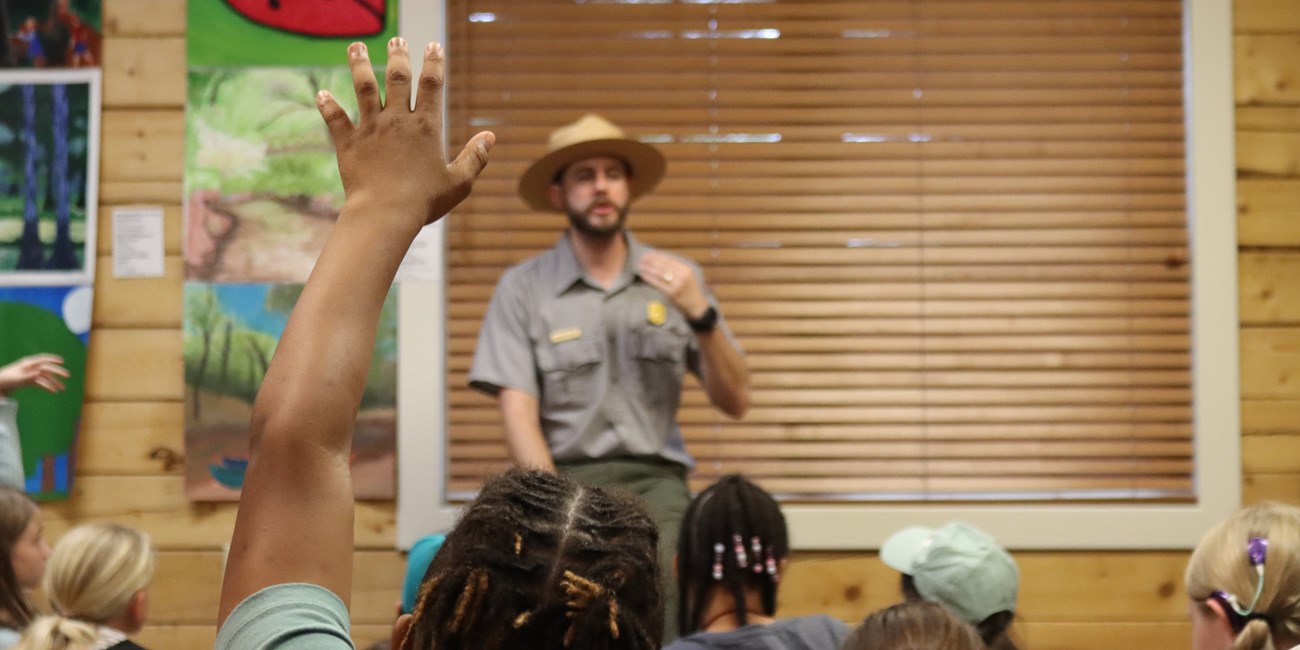
NPS Photo / Ian Kessler Elementary Grade LevelsThe preserve has developed original, free Texas Essential Knowledge and Skills (TEKS) based field trips for elementary grade levels. Explore Big Thicket elementary program descriptions below. All field trips can accommodate a half or full-day visit depending on scheduling needs. Programs offer ranger-led adventures in our visitor center as well as on trail and include hands-on materials, fun activities, and immersive experiences. If staffing allows, the preserve can typically welcome up to 80 students per visit. To accommodate larger groups, field trips may have to split up and schedule visits over multiple days. All field trips require a reservation. Other Grade LevelsAll ages and abilities are welcome for a visit to Big Thicket! A ranger-led hike or visitor center adventure may be possible for middle school, high school, or home school groups depending on scheduling and staff availability. Even if the preserve is unable to provide a custom TEKS-based program, rangers are able to conduct a brief welcome and Q&A session for groups on a self-guided field trip. All field trips require a reservation. Program Descriptions TEKS, featured content or props, and hiking trails for each grade level.
TEKS: Science 1.12.A & 1.12.C
Visitor Center Adventure: Students will explore the Visitor Center to learn about different environments and participate in an activity to learn about the diversity of Big Thicket. Students will focus on differentiating between living and nonliving things found in the Big Thicket and the connections between them. Hiking Adventure: Students will hike the Sundew Trail in the Hickory Creek Savannah Unit (1 mile), using their senses on observation breaks. Observations and connections between ranger provided props and living, nonliving things at the Sundew Trail will be recorded in field journals. TEKS: Science 2.13.B & Social Studies 2.15.C (visitor center) or Science 2.12.A & Social Studies 2.3.A (hiking)
Visitor Center Adventure: Students will learn how animals are adapted to different environments of the Big Thicket. Students will explore museum exhibits in the Visitor Center and engage with this information through whole group activities. Hiking Adventure: Students will learn about naturalist Lance Rosier as a way to behave during a hike. They will explore and create elements of a map and use it to form connections with the plants, animals, and seasonal changes of the Kirby Nature Trail area (1 mile). TEKS: Science 3.12.B (visitor center) or Science 3.12.C (hiking)
Visitor Center Adventure: Students will learn about the food webs in different environments of the Big Thicket. Students will explore museum exhibits in the Visitor Center and engage with this information through whole group activities. This adventure includes two activities, one outside and one inside the Visitor Center. Hiking Adventure: Students will navigate along the Pitcher Plant Trail (1 mile), stopping along the way to observe the Wetland Pine Savannah. Along the way they will observe longleaf pines and explore plant adaptations. TEKS: Science 4.12.A & 4.13.A TEKS: 5.12.A & 5.12.C
Visitor Center Adventure: Students will work in small groups to investigate an ecosystem of the Big Thicket. They will help teach the class about what they learned and build on that knowledge by interacting with ranger-provided artifacts or props from each ecosystem. Students will return to their ecosystems and examine how human interaction would impact the environment and its organisms. Hiking Adventure: Students will hike the Kirby Nature Trail (1.5+ miles). They will use diversity squares to learn about interactions between living and non-living features. They will make hypotheses and predictions about human interaction in three distinct environments along the trail. Students will work together in group and reflect independently while recording answers and observations in their adventure journals. 
NPS Photo / Kennie Merbach How to Reserve a ProgramApril and May are our busiest months of the year for school programs, in addition to being very hot and humid with many mosquitoes. Please plan accordingly and consider a trip during other months. Digital Reservation FormBe sure to include alternative dates for your visit. Please remember the preserve can typically welcome up to 80 students per day. To accommodate larger groups, field trips may have to split up and schedule visits over multiple days.
NPS Form 10-1750 (Rev. 04/2021) OMB Control No. 1024-0228 NoticesPrivacy Act StatementAuthority: Public Law 114-289 National Park Service Centennial Act and 54 U.S.C. 100701 Protection, interpretation, and research in System. Purpose: To administer education programs for education audiences including but not limited to school groups, scouting groups, extracurricular groups, and home school groups. Routine Uses: To effectively manage requests for education received by the NPS, the Education Reservation Request Form is used to collect basic education reservation information to facilitate operational aspects of scheduling groups for park education programs, including in-park education programs, ranger in classroom programs, and/or online distance learning programs. Disclosure: Voluntary, however, failure to provide the requested information may impede the ability to grant your education reservation request. Paperwork Reduction Act StatementWe are collecting this information subject to the Paperwork Reduction Act (44 U.S.C. 3501) to provide park managers and educators the information needed to schedule and conduct education program activities. All applicable parts of the form must be completed in order for your request to be considered. You are not required to respond to this or any other Federal agency-sponsored information collection unless it displays a currently valid OMB control number. OMB has approved this collection of information and assigned control number 1024-0288. Estimated Burden StatementPublic reporting for this collection of information is estimated to average 5 minutes per response, including the time for reviewing instructions, searching existing data sources, gathering and maintaining the data needed, and completing and reviewing the collection of information. Send comments regarding this burden estimate or any other aspect of this collection of information, including suggestions for reducing this burden, to the Information Collection Clearance Officer, National Park Service, 1201 Oakridge Drive, Fort Collins, CO 80525. Do not send your completed form to this address. 
NPS Photo / Kennie Merbach Still Have Questions?Email us at bith_information@nps.gov or call the visitor center at 409-951-6700. |
Last updated: July 15, 2025
